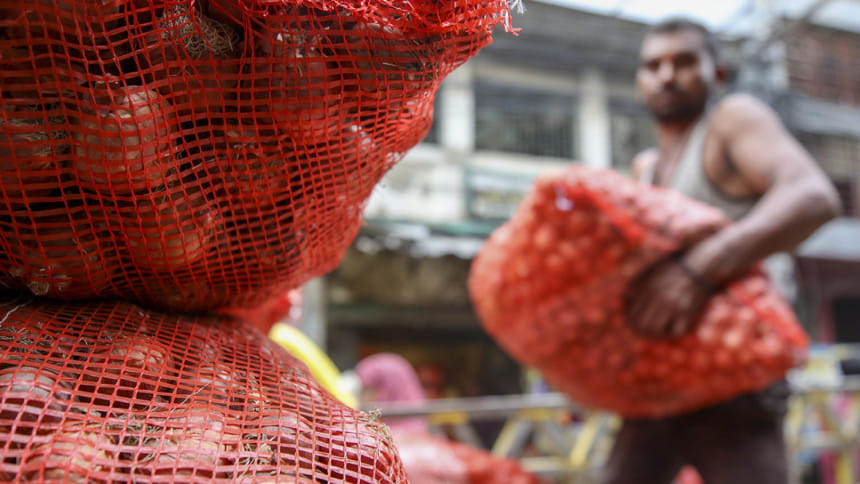Impact of coronavirus: onion, garlic, ginger prices rise

The prices of most everyday commodities including onion, ginger and garlic have risen at the country's largest wholesale market at Chattogram's Khatunganj, largely due to the spread of coronavirus in China.
However, China usually stops all export and import operations between January 20 and February 10 on occasion of Chinese new year holidays.
Sources said, traders have raised prices of these commodities in fear that imports from China will be hampered after the holiday period, due to the impact of coronavirus.
According to traders at Khatunganj, last week, price of onion has increased by at least Tk 30 per kg, while for ginger and garlic the prices increased by around Tk 40 and Tk 60.
Wholesale traders said that a week ago Myanmar onions were being sold at Tk 60 per kg and now its price is Tk 100. Besides, China onion is being sold at 70 per kg and Turkey onion is Tk 85 per kg.
Myanmar ginger was sold at Tk 100 per kg a week ago but is currently being sold at Tk 160. China ginger is also selling at Tk 145 per kg which was Tk 85-90 a week ago.
Mohammad Mizan, manager of M/s Meher Traders told The Daily Star, "The prices of ginger, garlic and onion are increasing almost every day."
Chinese businessmen have closed shipments at this time due to their holidays, he said. However, the prices would decrease to an affordable level if import from China and other markets resumes, he added.
Increased prices in wholesale markets have impacted all retail markets including Chattogram Kazir Dewri, Chawkbazar, and Riaz Uddin Bazar.
Alam Hossain of Sawadagar Traders in Chawkbazar, said these goods are being sold at a profit of Tk 10 per kg from the wholesale rates.
Abul Bashar Chowdhury, chairman of BSM Group, one of the largest commodity importers of Bangladesh, told The Daily Star "The export-import closure in China had both positive and negative impacts on the consumer goods market. Oil and wheat prices have already begun to drop in world markets as China was a big customer for these goods."
He said if the effect of coronavirus lasts for long in China, it will have a negative impact on the price and availability of garlic, onion and ginger, but there are opportunities to import these commodities from alternative markets.
China is expected to begin import-export operations from February 10 and the situation should be under control after that, added Abul Bashar Chowdhury.
Abdul Latif Bakshi, senior information officer at the Ministry of Commerce, told The Daily Star, "We have already conducted several meetings with trade bodies at the ministry. China has not made any decision on import-export with regard to coronavirus so far. After February 10, you will know what's going to happen next."
He said, "We do not have any information about the price hike so far. If we get such allegation we will conduct market monitoring."
Deputy Commissioner of Chattogram, Mohammad Elias Hossain, told The Daily Star, "We do not have information on rising prices of goods at wholesale and retail markets of Chattogram. We will conduct market monitoring if any direction comes from the ministry," he added.
DHAKA MARKETS EXPERIENCE PRICE HIKE
Meanwhile, prices of various essential spices and sugar went up in Dhaka's markets over the last several days.
Prices of garlic, imported from China, has been on top of the spiral list despite farmers harvesting garlic locally.
Imported garlic prices shot up to Tk 180 per kg yesterday, from Tk 150 a week ago, data from Trading Corporation of Bangladesh showed.
"There is a speculation that [the spread of] coronavirus might hamper shipment of garlic from China. This has drove up prices of Chinese garlic. Large traders have hiked prices," said Mohammad Shah Alam, a wholesaler of onion, garlic and ginger at Shyambazar, a major wholesale market in Dhaka.
Chinse garlic is popular in Dhaka and Chattogram, though locally grown garlic prices remained unchanged, he said.
Bangladesh annually produces around 4.5 lakh tonnes of onion against local demand of 6 lakh tonnes. The rest is imported mainly from China, according to industry estimate.

 For all latest news, follow The Daily Star's Google News channel.
For all latest news, follow The Daily Star's Google News channel. 








Comments